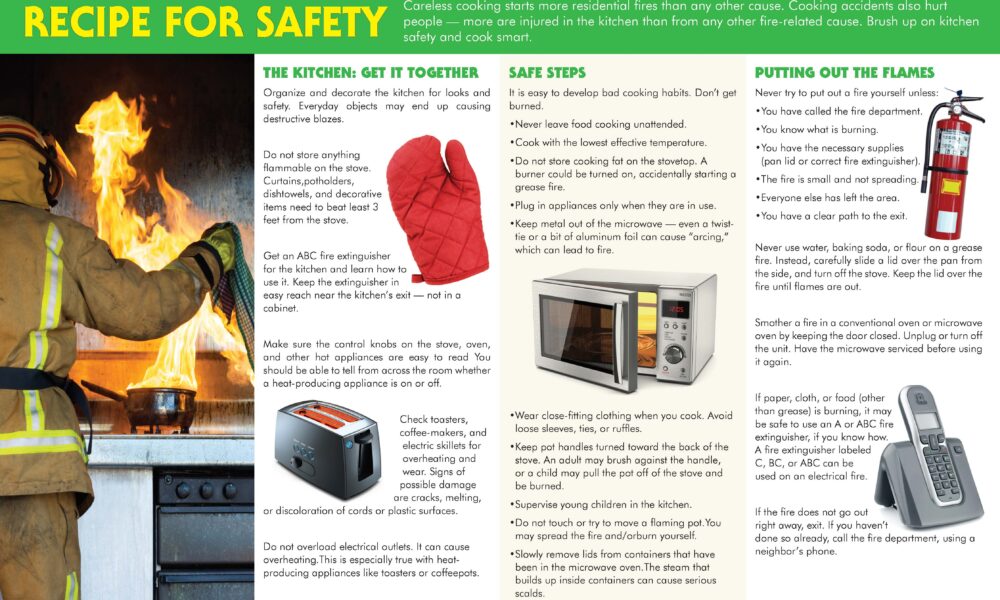Kitchen fires can start in an instant, often when you’re least expecting it. A simple mistake, like leaving food unattended on the stove or using oil for frying, can quickly turn into a dangerous situation. These fires are more common than many realize, and every year, thousands of homes are affected. But the good news is that with the right knowledge and preparation, most kitchen fires can be prevented or contained early, before they cause harm.
When a fire breaks out, your response matters. The first few moments can make all the difference in stopping the fire from spreading. That’s why it’s so important to have the right tools, like a fire extinguisher, close by and an action plan in place. Our experts at N8 Fire and Safety emphasize that being prepared—both with equipment and the right mindset—is crucial. Staying calm and knowing exactly what to do can help keep you and your loved ones safe. With a bit of preparation, you’ll be able to handle a Kitchen Fire Emergency confidently and effectively.
In this guide, we’ll walk you through the steps to take when faced with a kitchen fire emergency, how to prevent fires before they happen, and practical tips to ensure you’re prepared.
1. The Immediate Action: Stop the Fire from Spreading
Stay Calm and Assess the Situation
When a kitchen fire emergency happens, the first thing to remember is to stay calm. Panicking won’t help anyone, and it can cloud your judgment. Take a few deep breaths and quickly assess the situation. Is the fire small enough to put out on your own, or does it need professional help? The faster you can make this decision, the quicker you can act.
Turn Off the Heat Source
Once you’ve assessed the situation, turn off the stove, oven, or any heat source that could be fueling the fire. Shutting off the heat immediately can prevent the fire from getting worse and stop it from spreading. If it’s safe to do so, try to cover the fire with a lid or a fire blanket to cut off the oxygen and put out the flames.
2. Fighting the Fire Safely: Use the Right Tools
The Right Fire Extinguisher for Kitchen Fires
Not all fire extinguishers are the same, so it’s important to have the right one for the job. For kitchen fire emergencies, you’ll need an ABC fire extinguisher, which can put out different types of fires, including grease fires. Be sure to keep it in a location that’s easily accessible when cooking.
If the fire is grease-related, fire extinguishers for kitchens specifically designed for grease fires are essential. Fire extinguisher use is crucial for preventing further damage, but only attempt to put out the fire if you feel safe doing so.
When to Avoid Trying to Extinguish the Fire Yourself
If the fire is large or spreading quickly, or if it’s a grease fire that you can’t control, don’t hesitate to call emergency services. Some fires are just too dangerous to fight on your own. Fire emergency steps like calling 911 immediately can prevent a situation from turning into a catastrophe.
3. When to Call Emergency Services: Knowing Your Limits
If the fire grows out of control or you’re unsure how to handle it, call the fire department immediately. Remember, a small flame can spread fast, and steps to take during a kitchen fire emergency should include knowing when to ask for help. Firefighters are trained to handle dangerous situations and will arrive quickly to help manage the fire.
In many cases, waiting too long to call for help can result in significant damage to your home. Fire safety tips for families always stress the importance of knowing your limits, and knowing when to let professionals handle the situation is one of the most important steps.
4. Preventing Kitchen Fires: Proactive Fire Safety Measures
Common Causes of Kitchen Fires and How to Avoid Them
Many kitchen fire emergencies happen due to common causes like grease buildup, electrical issues, and unattended cooking. By being proactive, you can drastically reduce the chances of a fire starting in your kitchen.
- Grease fires are one of the leading causes of kitchen fires, so never leave hot oil unattended and always keep a fire extinguisher for kitchen fires nearby.
- Electrical issues like faulty wiring or overloaded circuits are another common culprit. Make sure your appliances are in good working condition, and don’t overload your electrical outlets.
- Unattended cooking is a big risk. Never leave the kitchen when cooking, and always keep an eye on what’s on the stove.
Installing smoke detectors and the importance of fire alarms in kitchens cannot be overstated. These alarms can alert you early if there’s any danger, giving you more time to act.
Kitchen Fire Safety Habits for Every Home
Good habits can go a long way in preventing fires. Simple steps like keeping flammable items away from the stove, checking for gas leaks regularly, and using the right fire suppression system can ensure your kitchen remains a safe place for cooking. Consider investing in a Chemical Suppression System San Antonio TX, which helps put out fires quickly and safely.
5. What to Do After a Kitchen Fire: Assessing Damage and Recovery
Assessing the Damage Safely
Once the fire has been put out and the area has cooled down, it’s time to assess the damage. Look for signs of structural damage, lingering smoke, or damaged electrical wiring. Never re-enter the kitchen if the fire caused significant structural damage, and don’t hesitate to call professionals to inspect the area for hidden risks. Ensuring your kitchen is safe before returning to it is a crucial step in your kitchen fire emergency plan.
Calling in Professionals for Cleanup
After the fire is under control, it’s important to call in professionals for cleanup and repairs. Cleaning up after a fire requires special care to avoid health risks and further damage. Whether it’s cleaning soot off the walls or repairing any structural damage, professional help ensures your home is safe and healthy to return to.
Final Thoughts: Stay Safe with Preparation, Not Panic
Being prepared for a kitchen fire emergency is essential to keeping your home and loved ones safe. The more you know about fire safety and the steps to take during an emergency, the more confident you’ll feel if something goes wrong. Have the right tools, like a fire extinguisher for kitchen fires, and keep fire safety items like smoke alarms and fire blankets within easy reach.
Creating a kitchen fire safety checklist can help keep you on track, and having a kitchen fire emergency plan will make all the difference when every second counts. Be proactive, and take steps today to ensure you’re ready for whatever comes your way.


Comment here